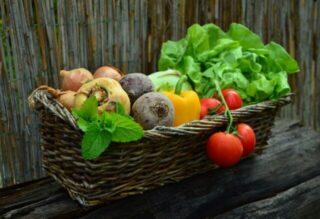How to keep your produce fresh isn’t as simple as just putting it in the refrigerator.
Preserving produce like leafy greens, carrots, and apples not only helps you to enjoy fresh fruits and vegetables longer, it can also minimize food waste.
The factors that affect produce freshness are: Temperature, humidity, and how long ago it was harvested before you brought it home, according to an article by The New York Times.
Most refrigerated produce stays fresh longer when sealed, which holds in moisture and protects it from ethylene gas.
How To Keep Produce Fresh
The best ways to keep certain kinds of produce fresh are:
- Potatoes and sweet potatoes: Don’t refrigerate, store in a cool, dark place, and allow air circulate around it. Keep separate from ethylene-emitting produce like bananas
- Root and tube produce: Beets, turnips, carrots, parsnips, and ginger: Remove leafy green tops, refrigerate in a plastic bag, or store loose in a refrigerator crisper drawer for up to two weeks.
- Onions and garlic: Don’t refrigerate, store in a cool, dark low-humid place, keep separate from potatoes, and allow air to circulate around them.
- Cabbage and its cousins: Refrigerate in a sealed container, uncut heads can go into a refrigerator without a bag, but once cut seal in an airtight container
- Winter squashes: Store at room temperature and keep away from ethylene-emitting produce
- Leafy greens: Refrigerate unwashed and seal in zippable plastic bags
- Apples and pears: Refrigerate in a plastic bag; use a crisper drawer and keep them away from ethylene-emitting produce
As New Jersey’s first and largest food rescue, our mission is to reduce food waste and provide nourishment to our food-insecure neighbors throughout North Jersey. We rescue millions of pounds of fresh food annually that would otherwise be wasted and end up in landfills. This contributes to climate change. We deliver it to partner organizations who support the nearly 1 million people in our area who need it most.
Together, we can reduce food waste in our home and make a positive impact on the planet. Every little bit of effort—no matter how small—leads to change.








